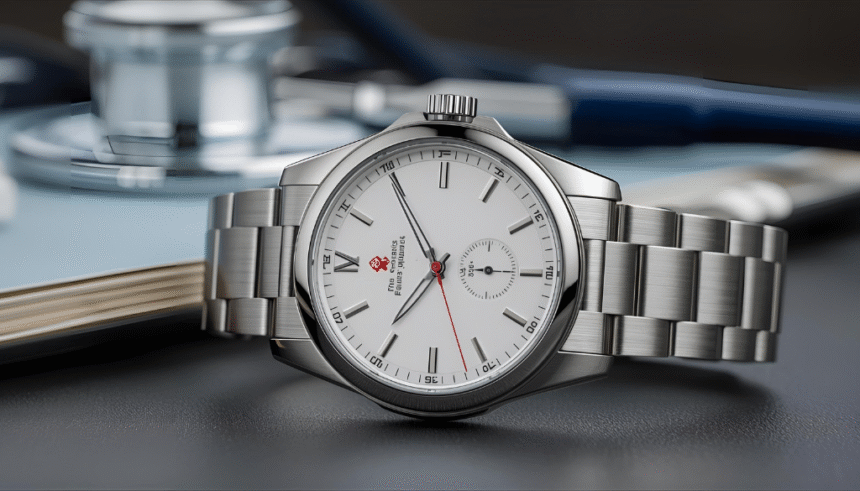What makes a watch more than just a timekeeping device? You might find this question intriguing, especially if you’re considering a medical watch tailored for men. These timepieces often embody a blend of functionality and understated style, serving as essential tools in the healthcare field while also complementing your personal style. Let’s uncover the subtle grace of medical watches and why they hold particular appeal for you.

This image is property of images.pexels.com.
Understanding Medical Watches
Medical watches are specialized timepieces designed primarily for healthcare professionals. They cater to the unique demands of their job, allowing users to time procedures, measure heart rates, and perform other essential tasks while maintaining a polished appearance.
Features of Medical Watches
When it comes to medical watches, several design elements distinguish them from regular watches. Here are some key features to consider:
-
Easy-to-Read Dial: The dial often boasts a clear, uncluttered face, ensuring you can easily read the time at a glance. The contrasting colors of the watch hands and the markings enhance readability, especially in dim light.
-
Durability and Resistance: Medical watches are typically designed to be water-resistant and scratch-resistant. This is crucial since you’ll be in environments where spills or impacts are common.
-
Hygienic Materials: Many medical watches utilize materials that are easy to clean and less likely to harbor bacteria. Stainless steel and silicone are popular choices for their durability and hygiene.
-
Lightweight Design: Since you may wear these watches for long shifts, they are often designed to be lightweight and comfortable.
Why Choose a Medical Watch?
You might wonder why medical watches are pertinent to healthcare professionals compared to standard watches. The answer lies in the unique blend of practicality and elegance that they provide.
Medical watches serve a dual purpose: they not only help you perform your professional duties but also add an air of professionalism to your attire. In many ways, your watch acts as an extension of your identity as a healthcare professional. It reflects your attention to detail and your commitment to quality in both your work and wardrobe.
Style and Functionality
While functionality is key, aesthetics also play a critical role in your choice of a medical watch. You want something that fits your style while still being appropriate for a professional environment.
The Aesthetic Appeal
Medical watches come in various designs, from minimalist styles to more elaborate ones. You could choose a classic leather strap for a timeless look or a modern silicone band for a more contemporary feel. Your watch can act as a statement piece, showing off your personal style while still being perfectly suited for your role.
Choosing the Right Design
When selecting a medical watch, consider how it aligns with your personal aesthetic. Here are some popular styles:
| Style | Description | Best For |
|---|---|---|
| Minimalist | Clean lines and a simple design | Everyday wear |
| Sporty | Robust, often with additional features like a stopwatch | Athletic healthcare workers |
| Classic | Traditional designs with leather bands | Formal settings |
| Modern | Trendy designs, often with bright colors | Young professionals |
Practical Versatility
The versatility of medical watches cannot be overstated. You can easily transition from a busy hospital setting to a casual outing without needing to swap timepieces. This practicality allows you to wear the same watch throughout your day, showcasing your multifaceted lifestyle.

This image is property of images.pexels.com.
The Histories Behind Medical Watches
Understanding the history of medical watches can deepen your appreciation for them, illuminating how they have evolved over time to suit the needs of healthcare professionals.
Evolution Over Time
The concept of the medical watch dates back to the late 19th century when early timepieces began to find their place in hospitals and clinics. Initially, pocket watches were common among doctors, but as the profession evolved and practices became more sophisticated, so too did the design of their timepieces.
With advancements in technology, wristwatches became the standard. Companies recognized the market potential and began to produce watches specifically designed for medical professionals. Modern medical watches are often outfitted with features tailored to the demands of the medical field.
Origins of Notable Brands
Many reputable brands produce quality medical watches today. Some have an extensive history that dates back to the early 1900s, while others are newer manufacturers striving to innovate in the watch industry. Consider the following examples:
| Brand | Year Founded | Notable Features |
|---|---|---|
| Timex | 1854 | Durable, affordable, reliable |
| Casio | 1946 | Multifunctional, digital options |
| Citizen | 1918 | Eco-Drive technology, stylish |
Having a historical context can add depth to your choice of a medical watch. Knowing the legacy behind your timepiece can evoke a sense of pride and responsibility in your role as a healthcare professional.
The Practicality of Medical Watches in Day-to-Day Life
For you, the daily routines involved in healthcare can often be hectic, characterized by constant motion and interruptions. This is where a medical watch truly shines, playing a pivotal role in managing your responsibilities.
Time Management
The ability to accurately time procedures and tasks can significantly influence patient care. Medical watches typically have features that aid this process, such as:
- Second Hand: Essential for measuring pulse rates and timing medical interventions.
- Date Function: Helps you remain organized and aware, even amid chaos.
- Alarm Functions: Useful for keeping track of medications or procedures that require specific timing.
By keeping time at your fingertips, you can maintain a steady workflow, reducing stress and enhancing your overall efficiency.
Communication Tool
In a medical setting, clear communication is vital. Your watch can serve as an understated signal. For instance, if you find yourself in a conversation with a colleague, glancing at your watch can discreetly convey that you are aware of time pressing upon you.

This image is property of images.pexels.com.
Selecting the Ideal Medical Watch for Your Needs
Buying a medical watch involves considering several factors to ensure that it meets your specific requirements. Here are essential elements to think about:
Understanding Your Needs
Before making a purchase, take a moment to reflect on your day-to-day tasks. What features would be most beneficial to you? Do you need a chronograph to time procedures, or is a simple, easy-to-read dial more appropriate?
Budget Considerations
When you’re ready to buy, set a budget. Medical watches range widely in price. Determine the features that are essential for your needs, and this will guide you in selecting the best timepiece for your budget.
Warranty and Customer Service
A quality warranty can provide peace of mind, especially in a profession as demanding as healthcare. Keep an eye out for brands that offer comprehensive warranties and exemplary customer service. This way, you can have your watch serviced or repaired when necessary without hassle.
Caring for Your Medical Watch
Once you find the perfect medical watch, caring for it will ensure it lasts through even the most demanding shifts. Here are some tips for maintenance:
Regular Cleaning
Maintaining cleanliness is paramount in healthcare. Ensure that you wipe your watch regularly with a soft cloth, especially if it has been exposed to bodily fluids or other contaminants. If your watch has a fabric band, consider washing it according to the manufacturer’s instructions.
Battery and Mechanism Care
For battery-operated watches, be proactive about replacing the battery to avoid unexpected timekeeping issues. If you’ve purchased a mechanical watch, ensure it receives the proper servicing at regular intervals to keep it functioning flawlessly.
Storage
When not in use, store your medical watch in a dry and cool place away from direct sunlight. This will help preserve its integrity and appearance, allowing you to keep it looking sharp for years to come.
The Role of Medical Watches in Shaping Professional Identity
Your choice of accessories can significantly impact the way you are perceived in your profession. A well-chosen medical watch not only serves practical purposes but can also communicate your commitment to professionalism and your passion for healthcare.
Building Trust and Credibility
Wearing a stylish yet functional medical watch can contribute to your professional image. The attention to detail in selecting your timepiece can communicate to patients and colleagues that you value quality in every aspect of your role.
Reflecting Personal Values
The watch you choose can also reflect your personal values. For instance, if you select a timepiece from a brand that emphasizes sustainability or ethical practices, this shows that you care about the same principles in your professional life.
Conclusion: The Lasting Impression of a Medical Watch
Your medical watch transcends being a simple instrument for telling time; it embodies the essence of your profession. With its blend of functionality, style, and history, it serves as a reminder of the dedication you show each day in your line of work.
Ultimately, the subtle grace of medical watches for men is not just in their appearance but in how they empower you to perform at your best professionally. As you navigate the fast-paced corridors of your healthcare facility, let your watch be a companion that supports you in every endeavor, helping you make a lasting impression on those you serve.
In the world you work in, where time often feels like a fleeting luxury, a quality medical watch is not merely an accessory but a valued tool that enhances your every moment—professionally and personally. So go ahead, let your watch do the talking, and carry the essence of your commitment and style on your wrist.

